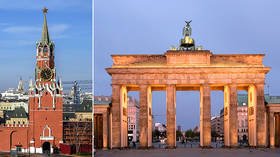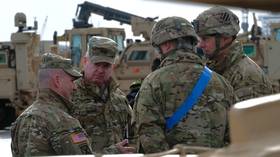75 years after ‘Stunde Null,’ collapse in Russian-German relations is driven by Berlin’s renewed desire to dominate Europe

For decades, elites in Russia and Germany spoke of the two countries’ special responsibility to guarantee peace and stability in Europe. Those days are over, as Berlin has apparently decided it no longer needs to listen to Moscow.
The mantra in the German capital these days is that the alleged poisoning of opposition figure Alexey Navalny was a “turning point” in relations with Russia. Germany will deprioritize efforts to understand Russia and act as a mediator between its Western allies and Moscow. The pessimistic sentiment about the state of affairs is largely shared by the Kremlin, which has reacted with great anger to Germany’s hostile response to the very peculiar case of the Moscow protest leader and anti-corruption campaigner.
It is the obscurity and irrationality of this incident and the extraordinary response to it that compels Russia to recognize that relations with Germany will continue on a downward trajectory. There is a growing awareness in Russia that the reputation of Germany as a benevolent and reliable partner has become outdated and now belongs to the past.
Despite the Russian-German historical rivalry for influence in Eastern Europe and two world wars, a benign partnership formed between the Soviet Union and West Germany during the Cold War. Bonn was committed to NATO and the then-European Economic Community (now the European Union) as the main two external institutional pillars, although the Germans also took on the role of understanding and engaging Moscow. This was partially because of the horror that their parents’ generation had unleashed on the USSR and also for practical reasons, given that the Soviets had effective control over a large amount of German soil as part of the post-war settlement.
Also on rt.com Germany & France will ask EU allies to place fresh sanctions on Russia over alleged poisoning of opposition figure NavalnyIn turn, West Germany’s stance had a great impact on Moscow as it demonstrated that the Germans did not conflate security maximization with power maximization.
As a medium-sized power in the Western bloc, West Germany had systemic incentives to augment its autonomy within the West by engaging the Soviet Union independently in a commercial partnership. In international relations, countries can be divided into political subjects and political objects. Political subjects have a seat at the table and make decisions, while political objects have decisions imposed upon them. Willy Brandt’s Ostpolitik, which began in 1969 and pursued security through engagement with the East, was important to restore the political subjectivity of Germany.
This effort was also important for Moscow, as it meant that relations between the Germans and the Russians were to a lesser degree hostage to US-Soviet relations.
When the Cold War came to an end, Moscow believed that the special partnership with Germany could be continued in order to overcome the legacy of a divided Europe. Moscow supported the reunification of Germany in the 1990s, and pinned its hope on Germany being a partner for the unification of the continent – to construct a Greater Europe. The ideas of the time spoke of a single area “from Lisbon to Vladivostok.”
However, the Germans did not support Russia’s political subjectivity by including it in the new European security architecture. Instead, the new Europe was to be constructed by expanding the US-controlled NATO and forming a greater EU that would eventually include all the states of Europe, except Russia. Presumably because Russia – with a population close to that of Germany and France put together – would dominate institutions, reducing Berlin to second fiddle, rather than top dog.
“European integration” thus became a continuation of Cold War bloc politics, a zero-sum rivalry that merely pushed the dividing lines of Europe towards Russian borders. Nonetheless, Russia continued to consider Germany its main partner on the continent.
As Berlin has become the de facto capital of the EU, the former incentives for benign relations with Russia are all but gone. Germany has taken the lead in advancing “European integration” and therefore prioritizes Eastern European member states that push for a more aggressive stance towards Russia. Economic connectivity with Russia is no longer an instrument for building trust and cooperation in the pan-European space, rather it was intended to strengthen Germany’s position as the center of the EU. Moscow should work with Berlin to construct Nord Stream 2, but not forget why Nord Stream 1 was built while South Stream was blocked.
Russia continued to hope that Germany was the main partner for Greater Europe that would assist in restoring Russia’s political subjectivity on the continent. However, Berlin rejected or ignored all Russian proposals, such as the call for a new European security architecture in 2008 and the EU-Russian common economic space from Lisbon to Vladivostok in 2010.
Germany pushes the policy of continued EU expansionism into the post-Soviet space and then champions the use of economic sanctions when Russia reacts.
Berlin played a central role in converting Ukraine into a bastion rather than a bridge by imposing the EU’s “civilizational choice,” supporting the riots when Kiev made what it considered to be the wrong decision, and then legitimizing the unconstitutional toppling of Yanukovich and Kiev’s “anti-terrorist operation” against Donbass.
Angela Merkel remains a leading voice for preserving anti-Russian sanctions that have now entered their seventh year. The days of Willy Brandt’s Ostpolitik belong to the bygone era, yet the idea of special Russian-German relations lived on in Moscow.
Also on rt.com ‘Huge step back?’ 30 years into German unity risks of new Cold War between Moscow & West are rising, German ex-diplomat tells RTThe recent incident involving Navalny has become a game-changer: This bizarre event has fuelled an international crisis far beyond the importance of the figure concerned. Navalny is an activist with marginal support in Russian society, and his appeal has been relatively stagnant over recent years.
There have been ample opportunities and means for Russian authorities to silence Navalny quietly, yet the prevailing thesis in Berlin is that the Kremlin attempted to assassinate one of its own citizens in a spectacular and public manner, but somehow failed.
Novichok is one of the most dangerous chemical weapons in the world, with a strong established brand name and obvious connotations in the West. We are to believe that Russian authorities were supposedly willing to use a chemical agent that could have caused mass casualties and chaos at a Russian airport, despite the fact that they decided to treat Navalny at a state hospital before approving his transfer to a German medical facility. The narrative of water bottles as the source of contamination, after Russia proved with CCTV that Navalny’s tea could not have been poisoned at the airport, only added to the absurdity. Why would Germany uncritically accept this narrative, and why is Navalny depicted as a great opposition leader that keeps Putin up at night?
Something has apparently changed following this event. While Moscow is unlikely to draw parallels between the Brest-Litovsk Treaty and Germany’s current European policies, it is evident that there is a return to history. Germany is no longer seeking to restore its political subjectivity as a middle-power in the West, rather it is leading the EU which has structured its interests in direct opposition to Russia. In its new role, Germany did not seek cooperation with Russia to resolve the Navalny case, but demanded an apology from Moscow and urged the EU to impose sanctions.
Moscow is subsequently becoming much more vocal in its criticism of Berlin and the imagery of Germany as the “good European.” Russian Foreign Minister Sergei Lavrov even argued that diplomatic relations no longer served a purpose: “Those people who are responsible for foreign policy in the West do not understand the need for mutually respectful conversation. Probably, we should just stop communicating with them for a while.”
So, here we are. 75 years after Moscow smashed Berlin's last attempt to dominate Europe, the Germans are back. We are a long way from the hopes of a united continent of equals, which looked possible just a quarter of a century ago.
Like this story? Share it with a friend!
The statements, views and opinions expressed in this column are solely those of the author and do not necessarily represent those of RT.
The statements, views and opinions expressed in this column are solely those of the author and do not necessarily represent those of RT.














